Milk AlternativesMilk is the primary source of protein in our diet. It is rich in nutrients and very beneficial for our bones and teeth. It boosts our immune system and maintains blood pressure. Generally, people use the milk of cows, buffalo, goats, and camels, which are rich in fat and protein. Milk is a dynamic product, which means it can be used in different forms like various kinds of cheese, curd, and butter, and used as an ingredient in various sweet and savoury dishes. All these milk products are very healthy and enhance the nutritional value of the milk. Milk is full of nutritional benefits, but it also has some disadvantages that harm people's health in the long run. Problems like digestive issues, body heaviness, acne, cardiovascular diseases, and reduction in bone mass are seen due to the usage of milk. Various people are lactose intolerant, which means they are allergic to milk and its products; some cases of prostate cancer have also been observed. These challenges deprive people of using milk and its products and raise the opportunity for other alternatives to milk for such people. There are various options available for lactose intolerant persons and those who want to be safe from any unwanted reaction to milk and its products but with the same nutritional benefits as milk. An ideal milk alternative should have features like there should be the minimum amount of required protein, no added sugar, must have a limited amount of saturated fat, sodium must be less than 140mg per cup, should be rich in calcium and vitamin D, and must have good fat like Omega-3. There are specific options available that fulfil the above requirements partially or wholly, as discussed below: 1) Coconut MilkCoconut milk is plant-based milk prepared from water and coconut cream. It is high in fat and has very low carbs with a similar texture to cow's milk. It has 34 calories with just 4g of saturated fat in a cup. 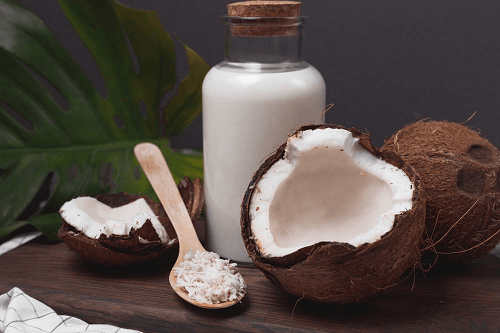
This milk is widely used in coastal areas in sweet and savoury dishes. It is also added to tea and coffee. It is helpful in weight loss, maintaining electrolyte balance, preventing anaemia and heart diseases, and boosting the immune system. It is suitable for the healthy growth of hair and skin. Sometimes it can also be allergic, can increase cholesterol, and may also cause fructose malabsorption. Despite these, it is also high in sugar content. 2) Almond MilkAlmond milk is plant-based milk made from almonds. It has a watery texture and a nutty flavour. It is a perfect option for lactose intolerant people and those who prefer vegan products. It has no cholesterol and low saturated fat. In 250 mL serving, there are only 39 calories, 1.5 g fat, just 0.21g saturated fat, 1.52g carbs, and 110 IU Vitamin D. 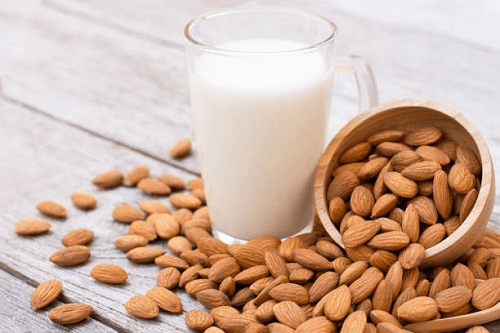
Almond milk is unsweetened, vegan, and contains high vitamin D content and low calories. It supports weight management due to low carbs. Some points are taken into account before using almond milk, like it may have effects on the thyroid gland, is not well for the child, and may cause abdominal issues and nut allergies. 3) Soy MilkIt is a similar alternative to dairy milk. Soy milk is also a plant-based alternative to milk prepared from soybeans. Soybeans are firstly grinded, then boiled, and after that, it is filtered to get the milk. Products like soy yogurt, creams, tofu, and cheese are made from soymilk. It is the first choice of any lactose intolerant and vegan person. 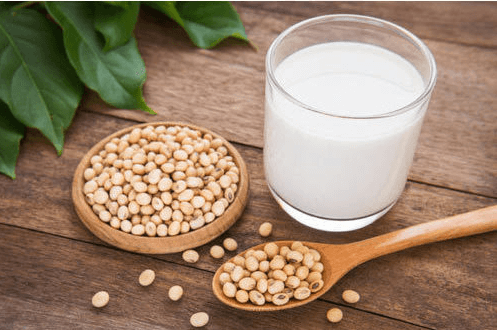
In 250mL of soymilk, there are about 80 calories, 6.9g of protein, 3.91g of fat, 0.5 g of saturated fat with 4.23g of carbohydrates. Soy milk improves brain and heart health and reduces symptoms of menopause. It is rich in calcium and iron with low saturated fat. It is full of protein and maintains hormonal balance. It provides riboflavin and Vitamin B12 and has a perfect shelf life than dairy milk comparatively. Soy milk is high in calories and sugar, which is one of its significant disadvantages. It also has high carbohydrate content. Various people are allergic to soy milk and its products, so it is necessary to check all pros and cons before using soy milk. 4) Oat MilkOat milk is plant-based milk obtained from whole oat grains. It has a creamy texture with a mild oat flavour. It is cholesterol free, high in protein and fibre with minimum saturated fat, which makes it nutritious. 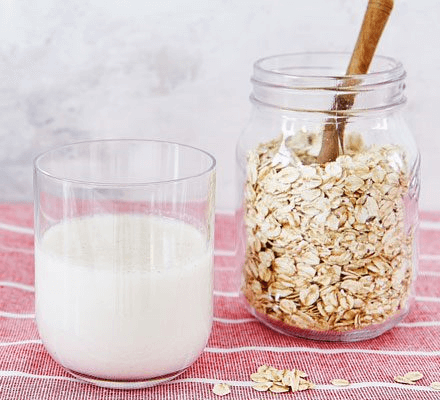
In 250mL of Oat milk, there are 120 calories, 5g of protein, 5g of fat, 0.5g of saturated fat, 16g of carbohydrates, 2g of fibre, and 7g of sugar. Oat milk has a lot of benefits, like it is vegan and lactose-free, fortified with riboflavin, and Vitamin B12, which is cholesterol free. This typically helps improve bone health and is very fibrous. There are some disadvantages that the users of oat milk have to face like it is not suitable for gluten intolerant people and people suffering from celiac diseases. Also, it is high in calories and sugar. Oat milk is used for coffee and yoghurt; various coffee outlets are now using oat milk instead of dairy milk because it is tasteful, frothy, and creamy. 5) Macadamia MilkMacadamia milk is made from macadamia nuts and water. It is also known as Queensland nut, bush nut, maroochi nut, etc. It is rich and creamy. 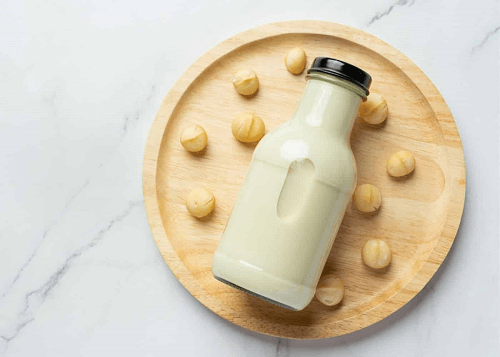
In 250mL of macadamia milk, there are 70 calories, 1g of saturated fat, zero cholesterol, 7g of carbohydrates, 6g of sugar, and 1g of protein. It has 105 g of sodium in 250ml of this milk. It is rich in calcium and contains vitamin D2 and B12. Macadamia milk is low in carbs and tested to be cholesterol free. Macadamia has selenium in high concentrations that could be toxic for the body; it is high in calories and has shallow protein content. 6) Cashew MilkCashew milk is milk made from cashew nuts and water. It is rich, creamy, and a good source of calcium, iron, and vitamins A, D, and E. It is the perfect replacement for dairy milk as it has fewer calories than other substitutes and consists of high nutritional values. 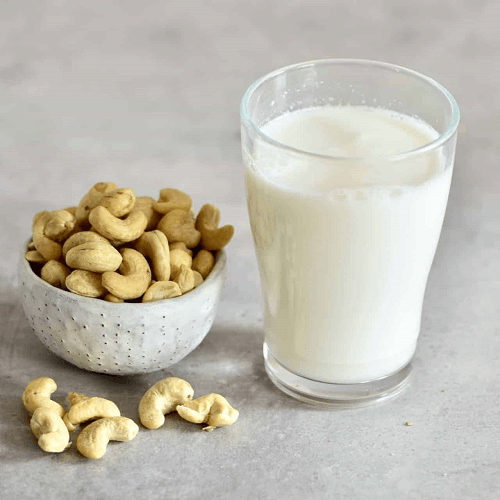
There are 18 calories, 1.4g of fat, 0.8g of carbohydrates, 0.4g of protein, 0.3g of saturated fat, and 40g of sodium in 100mL of serving. Cashew milk helps strengthen bones, prevents anaemia, maintains cholesterol levels, reduces the risk of muscular degeneration, and has vitamin E, which is very helpful for eyesight. Cashew milk is low in protein, and the cashew milk available on the market is often sweetened by adding sugar, which can be unhealthy. 7) Hemp MilkHemp milk is made from hemp seeds, which are soaked and grounded to form milk. It has a similar texture to cow's milk and is preferably used for a latte in the coffee category. 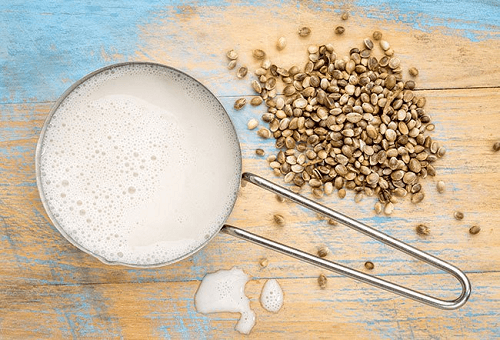
The 250mL serving of hemp milk provides 130 calories, 4g of protein, 3g of fat, 20g of carbs, 1g of fibre, and 15g of sugar. It contains unsaturated fats like Omega-3 and Omega-6. Hemp milk is good for skin and brain health; it strengthens the immune system, maintains blood pressure, and reduces the risk of heart problems. Some people may have allergies to hemp; it has low potassium and is not suitable for diabetic persons as it contains high sugar. These are the points that should be taken into consideration while selecting hemp milk as a substitute for dairy milk. 8) Hazelnut MilkHazelnut milk is prepared by the paste of hazelnut mixed with water to give a milk-like texture. It is also known as filbert and has a sweet and nutty taste. It is rich in nutrients like vitamins, fats, and minerals. 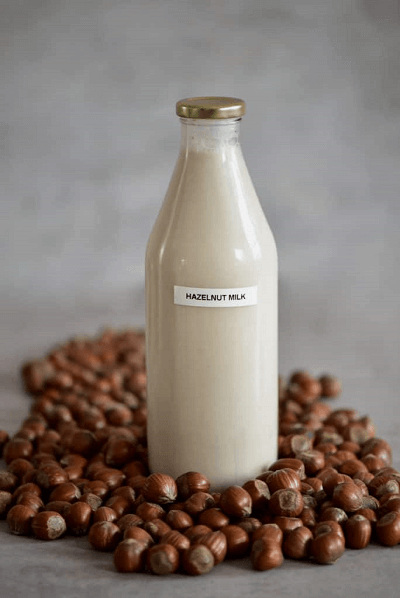
The 250mL hazelnut milk contains 110 calories, 37g of fat, 0.3g of saturated fat, 12g of protein, and 19g of carbohydrates. It has 0.7g of fibre and 14g of sugar. It has zero cholesterol. Hazelnut milk has antioxidant properties that protect it from cellular damage and cardiovascular diseases. It is lactose-free and hormone-free. Hazelnut is low in protein and has high sugar content, which is not suited for diabetic people. Also, it can be problematic for people who have nut allergies. 9) Quinoa MilkQuinoa milk is a lactose-free and gluten-free plant-based milk. It is prepared from quinoa grain and water; some flavouring agents are added to enhance the taste, like cinnamon, vanilla extract, etc. 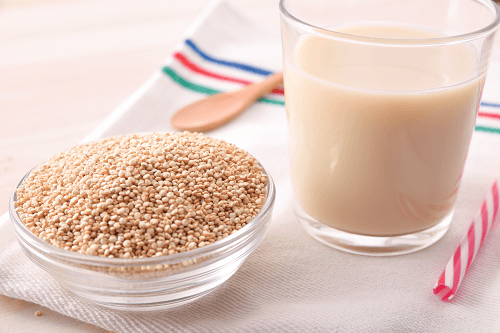
A 300g serving of quinoa milk contains 72 calories,1.2g of fat, 0.1g of saturated fat, 103g of potassium, 14g of carbohydrates, and 2.6g of protein. It has zero cholesterol and 5g of iron. 10) Potato MilkPotato milk is vegetable-based milk suitable for those who have nut allergies, as most of the dairy alternatives are nut-based. It is also suitable for people who cannot find many non-dairy options. It is free of lactose and gluten, which reduces the chances of allergies. It is rich in nutritional values like calcium and various vitamins. It is frothy and creamy in texture. 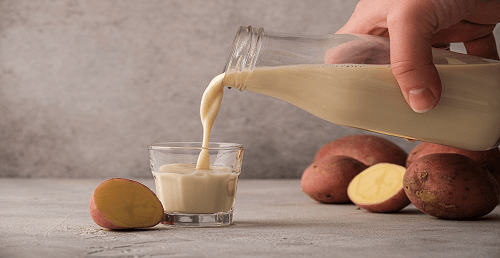
The 100gm of potato milk contains 39 calories, 1.3g of protein, 1.3g of carbohydrates, 120mg calcium, 30mcg of folic acid, and vitamins like vitamin D, Vitamin B12, riboflavin, etc. It has low calories and is free of lactose and gluten, making it the first choice for those who have nut allergies. It is suitable for strengthening bones as it has high calcium content. It is low in protein and has fewer carbs, which means it does not provide much energy and muscle growth. 11) Pea MilkPea milk is plant-based milk made from dry yellow peas, not green peas. It is used in the fortified form, mixed with sunflower oil and other micronutrients. It is marketed as a non-genetically modified alternative to soy milk. It is full of protein and other nutrients as it is made of legumes. 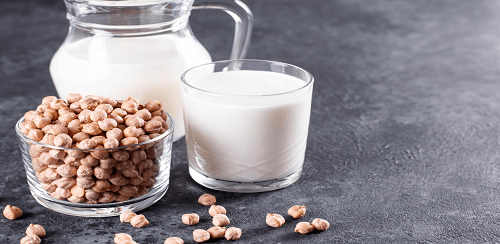
In 250mL of pea milk, there are 70 calories and 4.4g of fat. It contains vitamins A, D, B3, B6, and B12. It is rich in calcium and iron and fortified with Omega-3 fatty acids and protein. 12) Walnut MilkWalnut milk is super nutritious, with the appropriate amount of healthy fat and protein. It is used for smoothies, yoghurt, and ice cream. It is also used with different flavours like vanilla, cinnamon, etc. Two types of good walnut milk are available: Elmhurst Walnut milk and Mariani Walnut milk. 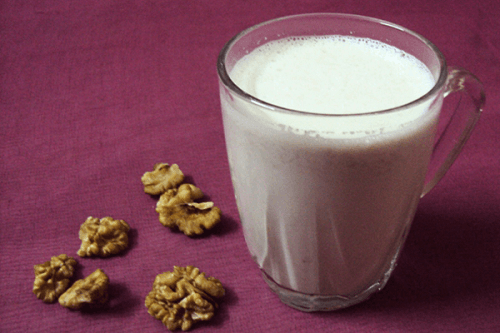
It is rich in protein, linolic acid, and Omega-3 fatty acids. In a cup of walnut milk, there are 120 calories, 11g of unsaturated fat, 3g of protein, and 1g of carbohydrates. Walnut milk has a high amount of good fat that is beneficial for the heart; it has antioxidant and non-inflammatory properties. Studies show that consumption of walnut milk tends to increase the bifidobacterial in the body. It is suitable for appetite and hunger that helps in weight control. The first thing that needs to be considered is that it may be allergic to people with nut allergies; it may aggravate ulcers and cause gastrointestinal issues. 13) Chia Seed MilkChia seeds milk is a fibrous and cholesterol-free milk alternative. Chia seed is also eaten raw with yoghurt and cereals. Chia seed milk is also a perfect option as compared to regular dairy milk; it is a thick and gel-like texture. 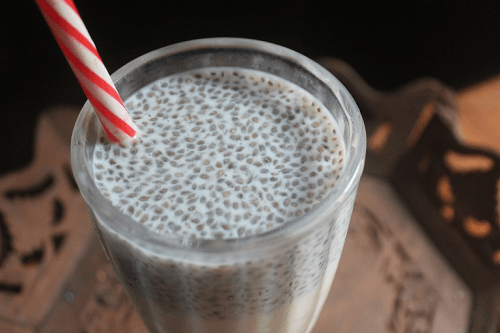
A single cup of chia seed milk contains 110 calories, 7g of fat, 2.8g of polyunsaturated fat, 13g of sodium, 43g of potassium, and 11g of carbohydrates. It has 3g of fibre and just 0.2g of sugar. It is also rich in nutrients like calcium, copper, manganese, and phosphorus and contains reasonable amounts of thiamin. Chia seed milk is fibrous that helps in weight loss; it increases good cholesterol HDL and reduces bad cholesterol LDL. It maintains blood sugar levels and reduces the chances of cardiovascular diseases due to Omega-3 and Omega-6. 14) Lacto- free milkLacto- free milk is the milk alternative free of lactose. It is suitable for those who have lactose intolerance because, in place of lactose, it has another element called lactase. Lactase breaks down lactose, which gives the milk its sweetness. Lactose-free milk has the same consistency and texture as regular dairy milk, as it is also dairy milk but with transformed nature. 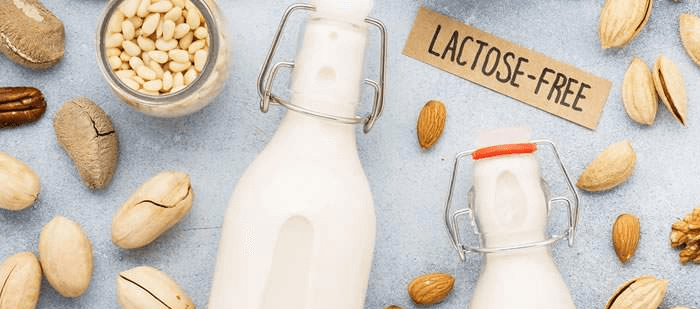
In 250g of lactose-free milk, there are 124 calories, 4.7g of total fat with 2.9g saturated fat, and 0.2g of unsaturated fat. It has 20mg of cholesterol, 127g of sodium, 395g of potassium, and 12g of carbohydrates. It provides 8.5g of protein and nutrients like calcium, vitamin C, and vitamin A. It strengthens bones and teeth, builds muscle, improves vision, keeps skin healthy, and strengthens the immune system. As it provides the same nutritional benefits as typical cow's milk, it also has some drawbacks that regular milk has. It is high in cholesterol and has a high amount of saturated fat and carbohydrates. Therefore, it makes sense to be preferred by those with lactose intolerance; otherwise, it is almost similar. So these were the various options for milk; one can choose any of them based on their preference because milk is essential for the growth of our body and mind.
Next TopicPlastic Alternatives
|
 For Videos Join Our Youtube Channel: Join Now
For Videos Join Our Youtube Channel: Join Now
Feedback
- Send your Feedback to [email protected]
Help Others, Please Share









